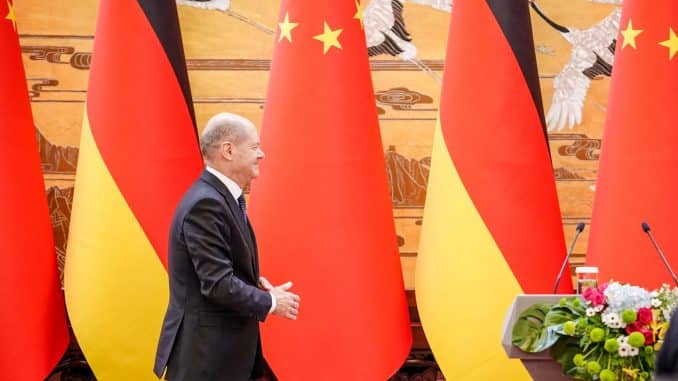
Germany and China warned jointly on Friday against further escalation of the war in Ukraine, during a closely-watched visit to Beijing by German Chancellor Olaf Scholz.
“I asked President Xi [Jinping] to bring his influence on Russia to bear. We agree that atomic threats are extremely dangerous,” Scholz said after their talks.
“We cannot afford further escalation,” outgoing Chinese Prime Minister Li Keqiang said in remarks to the press with the German chancellor. He expressed their joint hope for a quick end to the war and called for peace talks.
The comments appear to mark a change in rhetoric from Beijing. While China has not endorsed Russia’s invasion, it has deepened ties with Moscow and routinely blames NATO and the United States for the conflict.
Scholz’s trip – the first visit to China by a G7 leader since the outbreak of the coronavirus pandemic – has been eyed critically in Germany and Europe. It comes on the heels of last month’s Chinese Communist Party Congress, at which Xi secured an unprecedented third term in office, cementing his hold on power.
At the start of their meeting, Scholz stressed that he would bring up points of contention, while Xi expressed hope that differences could be left aside, with the aim of deepening cooperation.
“We are coming together at a time of great tension,” Scholz said. “In particular, I want to highlight the Russian war against Ukraine, which poses many problems for our rules-based world order.”
Xi said that both sides should observe the principles of mutual respect and the search for common ground, according to Chinese state broadcaster CCTV.
The current international situation was “complex and changeable,” Xi added, noting that China and Germany should work together as influential countries and make contributions to peace and development “in times of change and chaos.”
Scholz also raised the issue of Taiwan, warning China against military intervention. Any changes to the status quo could only be made “peacefully and by mutual agreement,” Scholz said after his talks with Xi and Li.
Beijing has repeatedly threatened an invasion of the democratic island republic if the Taiwanese resist peaceful “unification.” The communist leadership regards the island as part of its territory.
The German chancellor addressed the mistreatment of minority Muslims in the north-western Chinese region of Xinjiang, contradicting China’s classification of such statements as “interference in internal affairs.”
Before travelling to Beijing, Scholz had vowed to change the way Germany deals with China, promising a “candid exchange.”
Following Russia’s invasion of Ukraine, many are calling on Berlin to learn lessons and end its economic dependency on China, one of Germany’s biggest trading partners.
Scholz’s decision to travel with a dozen top business managers – including the chief executives of Volkswagen, BMW, BASF, Bayer and Deutsche Bank – came under particular scrutiny.
The visit, scheduled to last just 11 hours, was closely choreographed to meet China’s restrictive Covid-19 measures. Scholz underwent two Covid-19 tests before departure and a third PCR test on touchdown.
The entire delegation of more than 60 people was restricted to a strictly delimited zone, with those who enter this “bubble” subjected to 10 days of quarantine.
Xi greeted Scholz without a face mask, but both refrained from shaking hands and sat down for talks at two long tables keeping them at a distance.
Later, Scholz was received with military honours by the prime minister, in a reversal of protocol interpreted as a show of Xi’s hold on power. Previous chancellors have been met first by the premier, followed by the head of state.
At the meeting with Li, Scholz called China “a great country” that had a responsibility for peace in the world.
Scholz also dismissed criticism of his visit, saying that was “good and right that I am here in Beijing today.”
Ahead of the trip, Chinese dissidents and the World Uighur Congress had called for it to be cancelled.
Meanwhile, one topic that caused much furore ahead of the trip did not make it onto the agenda, Scholz said, referring to his decision last week to grant Chinese state shipping company COSCO a share of a Hamburg container terminal.
“I did not address it and others did not return to it either,” Scholz said.
Courtesy © dpa Deutsche Presse-Agentur GmbH www.dpa.com